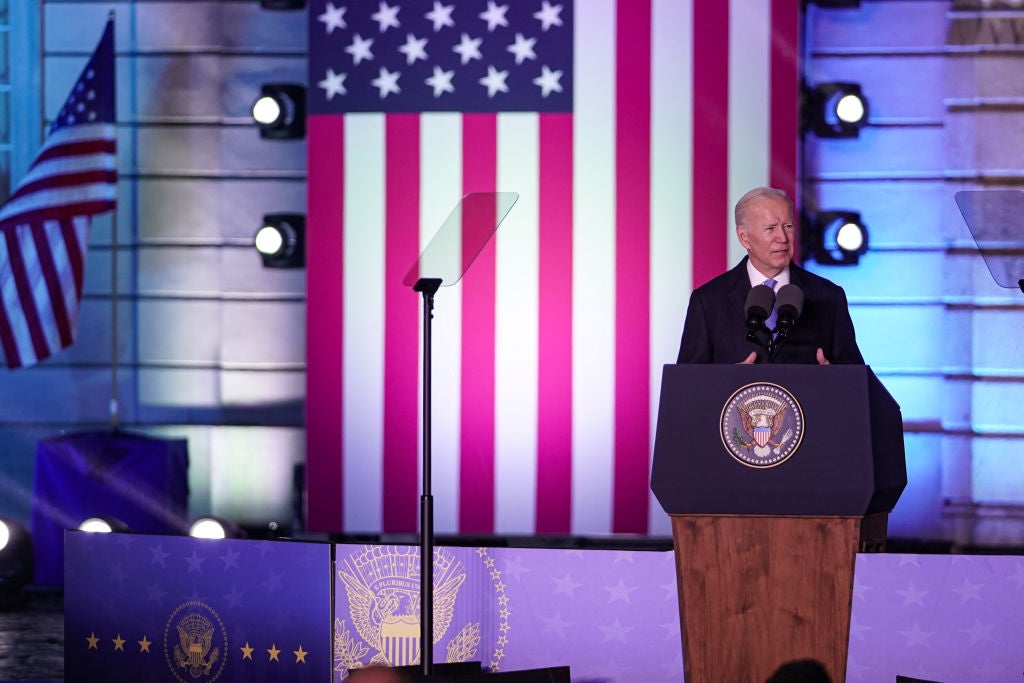
As Russia’s invasion of Ukraine enters its second month, there is still no end in sight to a war that both Russian and Western intelligence agencies expected to last a matter of days. Vladimir Putin’s finances aren’t the only ones being stretched, however – Western governments are beginning to feel the pinch too.
In his fiscal 2023 budget, announced on Monday, US President Joe Biden called on Congress to grant him $813bn in defence spending for the next fiscal year, a 4% increase on the 2022 budget, which was announced in 2021.
Biden is not alone in seeing the need for an increased military budget. Germany has pledged to raise defence spending by 0.6% of GDP, while the EU has announced an unprecedented €500m ($552.26m) in military aid to Ukraine.
Many governments are also likely to face significant short-term cost pressures arising from the influx of Ukrainian refugees. In 2016, Germany spent €9bn on processing and caring for 750,000 refugees. More than five times that number (3.8 million) have already fled the country, according to the UN, with two million asylum seekers thought to have gone to Poland alone.
The spectre of rising energy prices
Much more significant, however, is the pressure on governments to combat soaring food and energy prices. Prior to the invasion, prices in Europe and North America had already been rising at rates not seen for decades – largely due to post-pandemic supply chain disruptions. The invasion and the Western response, in the form of severe sanctions against Russia, have only exacerbated those pressures.
Energy prices may still have a long way left to rise. Western powers are mulling the possibility of a global ban on the import of Russian oil, an action that could send oil prices skyrocketing in the absence of a compensating increase in production elsewhere – hence Washington’s frantic courting of long-time foes Venezuela and Iran.

US Tariffs are shifting - will you react or anticipate?
Don’t let policy changes catch you off guard. Stay proactive with real-time data and expert analysis.
By GlobalDataMeanwhile, European imports of Russian gas are daily undermining the effectiveness of sanctions by refilling the country’s depleted foreign currency reserves. The end of German Ostpolitik has led the EU to at last take seriously the need for energy independence from Russia, but achieving this in the short term will require a shift to much more expensive liquefied natural gas as well the speedy construction of the necessary processing infrastructure. As with oil, sanctions on natural gas will only raise prices further unless someone else ramps up production.
As economist Oliver Blanchard has argued, the usual playbook of economically orthodox governments responding to commodity price shocks (namely, to stand back and watch) no longer applies. In much of the West, inflation is high enough already that further increases could cause acute pain for those on the lowest incomes, as well as potentially severe damage to economic growth. Coming right as the West faces its most significant geopolitical confrontation in living memory, those possibilities will be hard to swallow.
Governments make their moves on rising energy prices
The argument for government intervention has already won the day in much of Europe, where governments are implementing a mix of direct cash transfers, price caps, tax cuts and subsidies to help citizens cope with their rising energy bills.
The budgetary pressures have come just as many Western governments were hoping to make cutbacks on government spending, which reached record highs during the Covid-19 pandemic.
In the UK, the Conservative government has opted to stick to these plans. With inflation expected to average 8% over the 2022–23 financial year, Chancellor of the Exchequer Rishi Sunak announced in late March that benefits would rise by only 3.1% – a real-terms cut of more than 5%.
As a recent report by the OECD notes, however, the massive increase in debt during the pandemic hasn’t translated into unsustainable debt burdens. Despite the rise in inflation, interest rates remain at close to record lows.
Crucially, the impact of this additional spending on inflation is likely to be limited. The OECD’s analysis found that a government stimulus equivalent to 0.5% of GDP in all the bloc’s members would halve the impact of the war on growth while only adding slightly to inflation.
However, a back-of-the-envelope calculation by Bruegel puts the cost for the EU at about €175bn, or 1% of GDP. Whether the Western economies can soak up that level of additional spending remains an open question.
Understand the impact of the Ukraine conflict from a cross-sector perspective with the Global Data Executive Briefing: Ukraine Conflict.



